- Home
- R. A. Spratt
No Rules Page 2
No Rules Read online
Page 2
‘Let’s just fill out your paperwork and I can begin trying to process it,’ said Mr Quigley, taking a set of forms out of his briefcase. ‘We’ve located your parents now. They’re at a university in Estonia. Once we have all your information, we’ll get them to fill out the forms.’
‘If you do find them, you’ll never get them to fill out the forms,’ said Friday. ‘Certainly not properly. They couldn’t even give my name to the birth registrar. It would be much better if you simply issued me with an exigent circumstances passport.’
‘We can’t do that,’ said Mr Quigley. ‘That’s only for the most exceptional circumstances, for political refugees and defectors.’
‘I am exceptional,’ said Friday.
‘You’re certainly not exceptionally modest,’ said Mr Quigley with raised eyebrows.
‘I’ll prove it to you,’ said Friday. ‘I’ll find the necklace.’
‘You’re not allowed to leave the airport transit lounge,’ said Mr Quigley.
‘That will be the bit that proves I’m exceptional,’ said Friday with a smile.
‘I haven’t got time for this,’ said Mr Quigley, reflexively glancing at his phone even though it was turned off.
‘Really?’ said Friday. ‘You haven’t got time for a fifteen-minute conversation with me that could result in you finding the necklace as soon as you get back to Geneva?’
Mr Quigley hesitated. He was clearly warring with himself.
‘I’ve solved bank robberies, thwarted smuggling operations and uncovered escaped convicts,’ said Friday. ‘Your problem is well within my skill set.’
Mr Quigley sighed. ‘You’re not going to shut up until we do this, are you?’
‘No,’ agreed Friday happily.
Chapter 3
The Case of the Stolen Necklace
‘All right, tell me where the necklace is,’ said Mr Quigley unenthusiastically.
‘I’ll need to ask you a few questions first,’ said Friday. ‘Who are your suspects?’
‘We don’t have any,’ said Mr Quigley with a shrug. ‘We’ve got no idea how the thief broke in.’
‘They can’t have broken in,’ said Friday. ‘Embassies have the highest level of security. It would be impossible to break in without leaving some evidence, a scratched lock, a shadowy figure on security footage, a dusty footprint, something like that. It must have been an inside job.’
‘How dare you!’ exclaimed Mr Quigley. ‘Embassy staff are hand-picked for their honesty and integrity.’
‘Please,’ said Friday. ‘You’ve admitted you talk on the phone while you’re driving, so you’ve already demonstrated moral flexibility. Just tell me, who was in the embassy?’
‘I can’t tell you that,’ said Mr Quigley.
‘Okay,’ said Friday, ‘I’ll work it out. I know from the paper that the Ambassador has a wife and two teenage children. The necklace was stolen at night, so there would be none of the day staff, just some security guards and servants.’
‘There are no live-in servants,’ said Mr Quigley. ‘This isn’t the nineteenth century.’
‘There would be a few officials on the night desk. They are on call 24/7,’ said Friday. ‘An embassy always needs to be able to react to events. So someone would be on duty to inform the Ambassador if he had to launch into action.’
‘It can’t have been any of them,’ said Mr Quigley, shaking his head. ‘The necklace was stored in a special high-security display room in the residence.’
‘Tell me about the room,’ said Friday. ‘What security measures were in place?’
‘The room is the most secure place in the embassy. There are no windows, air conditioning vents or under-floor access points. There is no way in, except through the door,’ said Mr Quigley.
‘Tell me about the door and the locks,’ said Friday.
‘It’s a ten-foot-high steel-lined double door with a titanium frame bolted into the stone walls,’ said Mr Quigley. ‘It has two sets of deadlocks. One at ground level and the other at the top of the door.’
‘I see,’ said Friday. ‘So you need a key to lock or unlock the door?’
‘The display room is in the domestic quarters,’ continued Mr Quigley, ‘and at night that area is entirely sealed off from the embassy offices, in case there is some sort of political attack.’
‘So it was just the family in the domestic quarters?’ asked Friday.
‘No, the Ambassador had taken his family skiing for the weekend. The only person in the domestic area was the chef,’ said Mr Quigley. ‘He was working through the night making a huge ice sculpture and a blackforest cherry cake for the big black-tie dinner. He heard a noise coming from the display room and went to investigate.’
‘I see, and according to the papers the chef was assaulted by the thief,’ said Friday.
‘Yes, we haven’t been able to get much sense out of him,’ said Mr Quigley. ‘He had a big lump on the back of his head, and he’s in hospital being treated for hypothermia.’
‘How did he get hypothermia?’ asked Friday.
‘He was soaking wet when we found him,’ said Mr Quigley. ‘His clothes were completely drenched. The thief locked him in the display room so he couldn’t raise the alarm.’
‘Did the chef have a key to the display room?’ asked Friday.
‘Yes, it was still on him when we found him,’ said Mr Quigley.
‘So if he had regained consciousness, he could have let himself out,’ said Friday.
‘No,’ said Mr Quigley, ‘because he would have had no way of reaching the lock at the top of the ten-foot-tall door.’
‘Ahh,’ said Friday. ‘The classic closed-room conundrum.’
‘Huh? Has living in the airport affected your mental health?’ said Mr Quigley, starting to look optimistic. ‘If it has, that’s great, I can use that to get you released into a hospital. Admittedly, a mental hospital, but it might do you some good.’
‘The answer lies with the missing ice sculpture,’ said Friday.
‘What?’ said Mr Quigley.
‘You mentioned it earlier when you were talking on the phone,’ said Friday. ‘An ice sculpture has gone missing from the embassy.’
‘Yes, but I don’t see what that’s got to do with anything,’ said Mr Quigley. He was looking thoroughly confused.
‘Which is exactly what the thief wanted you to think,’ said Friday, ‘or, rather, not think. Because that’s what the thief wanted – for you to not think about the ice sculpture.’
‘So where is the ice sculpture?’ asked Mr Quigley.
‘Oh, you’ll never find it,’ said Friday.
‘Are you trying to irritate me?’ asked Mr Quigley.
‘It melted after it was used by the thief,’ said Friday.
Mr Quigley stood up. ‘I’ll write to your parents. You’re being purposefully obstructive. I can’t deal with you.’
‘The necklace was stolen by the chef,’ said Friday. ‘He was the only person with the opportunity to commit the crime, so he had to divert suspicion away from himself. After he stole the necklace, he hid it somewhere in the kitchen. Then he locked himself in the display room, and gave himself a bang on the head to make the whole thing believable.’
‘But that’s impossible,’ said Mr Quigley. ‘There is no way the chef could have locked the door from the inside, not without a ladder. And there was no ladder in the room.’
‘Ah, but there was a four-foot-tall ice statue,’ said Friday. ‘The chef slid that into the room, stood on it to lock himself in, then waited for the sculpture to melt. Once it was nothing more than a puddle, he rolled in the water to hide the evidence. Hence the hypothermia.’
‘I suppose it’s possible,’ said Mr Quigley. ‘But it’s also ridiculous. It’s impossible to prove.’
‘Not when you find the necklace,’ said Friday.
‘You can’t know where that is,’ said Mr Quigley.
‘But I do,’ said Friday. ‘With the necklace stolen, the chef knew that
the embassy would be searched. He needed to hide it somewhere no one would look.’
‘Please don’t tell me he swallowed it,’ said Mr Quigley.
‘No, but you’re thinking along the right lines,’ said Friday. ‘He hid it in the cake.’
‘That’s crazy,’ said Mr Quigley.
‘Not at all,’ said Friday. ‘With the necklace gone, the chef knew the dinner would be cancelled. No one would want the cake. It would be his to dispose of as he chose.’
‘The whole scenario is far-fetched,’ said Mr Quigley.
‘It is,’ agreed Friday. ‘But it is the only scenario that fits the facts; therefore, ridiculous as it is, that’s what happened.’
Mr Quigley looked at her.
‘If I were you,’ continued Friday, ‘I’d turn my phone back on now, call the embassy and ask the head of security to look in that cake.’
Mr Quigley considered the situation.
‘Or you could ignore my advice and let the chef dispose of the cake,’ said Friday. ‘I’ll bet he says something virtuous, like he’s going to donate it to a homeless shelter or something. The great thing is, because Switzerland is such a small country, he can have it across the border in a couple of hours.’
Mr Quigley grabbed his phone and started dialling. ‘Roberts, there’s a giant blackforest cherry cake in the kitchen. I need you to search the cake. You heard me, look inside the cake for the necklace. I don’t care. Use your hands if you have to.’
Two minutes later the head of security came back on the phone. The necklace was found. The chef had hidden it in the creamy filling between the third and fourth layers of sponge.
An international crisis had been averted.
After 45 minutes of filling in forms and copying documents, Friday was handed a brand new passport.
‘Congratulations, you are now a citizen,’ said Mr Quigley, shaking her hand.
Friday had never been so relieved to hold a document. The cover was still neat and crisp, and had gold embossing. She opened it up to the photograph page. The photo of her was predictably awful. It was the one Interpol had taken when she had tried to enter Switzerland without any papers.
‘Hey, it’s made out to Freitag Scheunen!’ said Friday.
‘That’s your name,’ said Mr Quigley.
‘Only officially,’ said Friday.
‘We’re a government agency,’ said Mr Quigley. ‘We only do things officially. If you want to change your name, you will have to contact the appropriate authorities and fill in the necessary paperwork when you get home.’
‘But I’m twelve,’ said Friday. ‘My parents are going to have to sign the forms. It will take me forever to get hold of them to do that.’
‘I can’t solve all your problems,’ said Mr Quigley. ‘I’ve just rescued you from living in an airport. That will have to be enough for today. The embassy will book you a flight home. We’ll bill your parents for it later.’
‘No need,’ said Friday, pulling her wallet out of her pocket. It was bulging with cash of all different denominations. ‘I’ll sort it out myself. The lady at the Lufthansa desk owes me a favour. I’ve been coaching her in economic theory to help her pass the MBA admissions exam. If I book a flight with her, she’ll be able to get me an upgrade to business class.’
‘I’m glad you’ll soon be on home soil,’ said Mr Quigley. ‘Switzerland’s loss is our gain.’
Chapter 4
The Return
When Friday stepped through customs into the arrivals hall, she was immediately grabbed in a total body lock. That’s what it felt like getting a bear hug from someone as big as Uncle Bernie.
‘I’m so glad you’re home,’ said Uncle Bernie.
‘Me too,’ said Friday.
‘I was so worried,’ said Uncle Bernie. ‘And it was all my fault. When those immigration officials came to your school, I should have tackled them and given you a chance to make a run for it.’
‘It’s best you didn’t,’ said Friday. ‘You would have got in trouble. And I’m terrible at running, so it never would have worked.’
‘Now that you’ve got your freedom, what do you want to do first?’ asked Uncle Bernie.
‘Go to school,’ said Friday.
‘You don’t want to celebrate by going to a fun park or having a day at the beach?’ asked Uncle Bernie.
‘Come on, this is me,’ said Friday. ‘School is my idea of a fun park.’
‘All right,’ said Uncle Bernie, shaking his head. ‘I suppose you’re worried about being three weeks behind on the coursework.’
‘Of course not,’ said Friday. ‘The coursework is a doddle. Except for PE – that’s cruel and unusual torture. I just want to get back to the school. International airports are interesting, but when it comes to a hotbed of human conflict, greed, jealousy and crime you can’t beat Highcrest Academy. I think it’s all the hormones in the teenagers. They live their lives on a higher level of drama than normal people.’
Two hours later, Uncle Bernie and Friday pulled into the driveway of Highcrest Academy. It was 10 o’clock on a Wednesday morning. Normally you would expect to see students playing cricket or doing rugby drills on the sports fields, or drive past a biology class being forced to observe the fauna in a clump of bushes. But there was no one about.
‘It seems oddly quiet,’ said Friday.
‘Maybe they’re having a school assembly,’ said Uncle Bernie.
‘On a Wednesday?’ said Friday. ‘Don’t be ridiculous. Mrs Marigold serves pancakes for breakfast on Wednesdays, so by 10 o’clock in the morning the Headmaster will be asleep in the armchair in his office. Carbohydrates have that effect on him. There’s no way he’d interrupt that for an assembly.’
Uncle Bernie parked at the top of the driveway.
‘Are you sure it’s okay if I just drop you off?’ said Uncle Bernie. ‘Your school gives me the heebie-jeebies. It’s like travelling back in time to a boarding school in a Dickens novel. But this time it’s weirdly quiet.’
At that moment there was a roar of cheers from a distant crowd.
‘What was that?’ asked Uncle Bernie.
‘It sounded like a football crowd,’ said Friday. ‘So there must be plenty of people here. I’ll be fine. You’ve got to get back to work.’
Friday hugged Uncle Bernie and waved goodbye, then walked past the administration building toward the school quadrangle.
When she got there it was a shocking sight. Instead of seeing the ordered progress of students going about their day, there was total chaos. The students were dressed like savages.
There was no school uniform at Highcrest Academy, but there was a dress code. Boys were meant to wear collared shirts, and on their bodies, not wrapped around their heads. Shoes were meant to be worn on feet, not used as projectiles hurled at fleeing year 7 students. And many of the students seemed to be wearing a mimicry of tribal war paint.
In the centre of the quadrangle was the most bizarre thing of all.
Two huge catapults had been constructed. One was loaded with an overhead projector, while the other was being loaded with a three-drawer filing cabinet by Lizzie and Max Abercrombie. Friday had not had much to do with the twins who were in year 9, because they were good-looking and athletic, so she didn’t have much in common with them.
‘Are you ready?!’
Friday looked across to see Ian Wainscott holding onto the flagpole and hanging a metre off the ground by balancing his weight on the rope hook. The crowd turned to him, hungry for his leadership.
Friday was thoroughly shocked by the anarchy of the situation. But a small part of her brain was still able to register that Ian looked very attractive without his shirt on. His athletic frame, low body fat ratio and swimmer’s tan combined to create an appealing effect. At least, that’s how Friday’s brain interpreted what her hormones were telling her.
‘Thank goodness you’re back!’
Friday turned to be enveloped in her second big hug of the day. It was Melani
e Pelly, her best friend.
‘Don’t ever leave me again,’ said Melanie.
‘That’s a bit strong,’ said Friday, releasing herself from Melanie’s grip. ‘You can cope without me. You were here for a year before I started.’
‘I know I can cope,’ said Melanie, ‘but I don’t want to. Things are so much easier when you’re here to make sure I don’t lock myself out of our room, give me all the answers to the homework questions and remind me which lesson we’re sitting in.’
‘What happened?’ asked Friday, turning back to the scene in the quadrangle. ‘I’ve only been gone three weeks. How did the school end up like this?’
‘Everything was the same as usual for two weeks and six days,’ said Melanie. ‘Except you weren’t here, so I had to go to all my classes, which was exhausting. Things were a little dull, really. Then, on Monday, everything exploded.’
‘Literally?’ asked Friday. She enjoyed weapons-grade explosives as much as the next curious-minded pre-teen, and she would have been disappointed to miss a large blast.
‘No, emotionally,’ said Melanie. ‘The teachers all received letters telling them they had been fired.’
‘The Headmaster fired everyone?!’ said Friday.
‘No, the letters came from the school council,’ said Melanie. ‘They said that because of the school’s ongoing descent into shambolic academic ineptitude, they were going to hire an entirely new teaching staff.’
‘So the school has been without teachers for twenty-four hours?’ said Friday.
‘Worse than that,’ said Melanie. ‘There’s no cook. Mrs Marigold was fired, too. We’ve been reduced to foraging in the vegetable garden and fishing in the swamp.’
‘Why didn’t you just order pizza?’ asked Friday.
‘We did at first, but the pizza shop in town refuses to deliver anymore,’ said Melanie. ‘They made the mistake of sending out their cutest delivery boy. He never stood a chance.’
‘But what is the Headmaster doing about all this?’ asked Friday. ‘Why has he let this happen?’

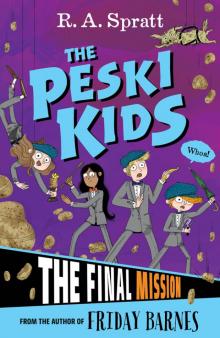 The Final Mission
The Final Mission Stuck in the Mud
Stuck in the Mud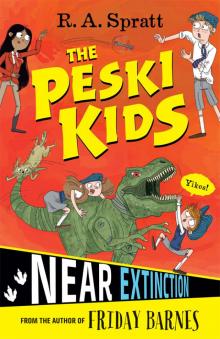 Near Extinction
Near Extinction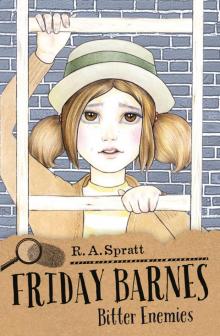 Bitter Enemies
Bitter Enemies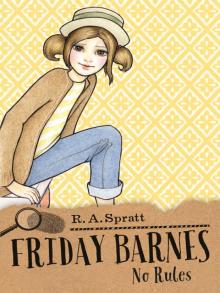 No Rules
No Rules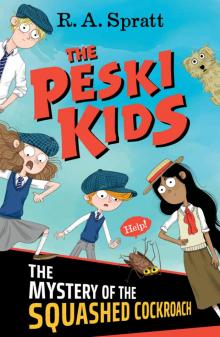 The Mystery of the Squashed Cockroach
The Mystery of the Squashed Cockroach The Plot Thickens
The Plot Thickens Nanny Piggins and the Accidental Blast-off
Nanny Piggins and the Accidental Blast-off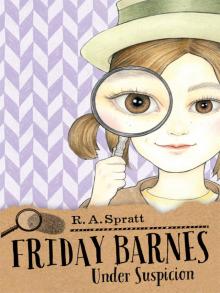 Friday Barnes 2
Friday Barnes 2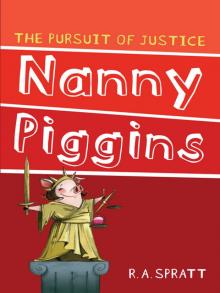 Nanny Piggins and the Pursuit of Justice
Nanny Piggins and the Pursuit of Justice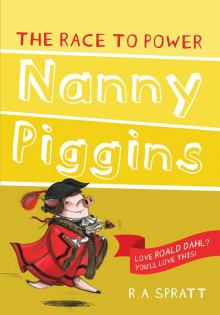 Nanny Piggins and the Race to Power 8
Nanny Piggins and the Race to Power 8 Nanny Piggins and the Wicked Plan
Nanny Piggins and the Wicked Plan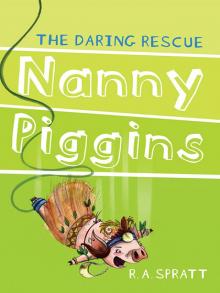 Nanny Piggins and the Daring Rescue 7
Nanny Piggins and the Daring Rescue 7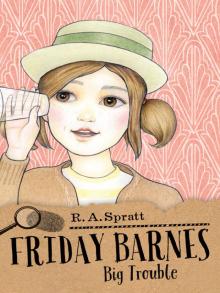 Friday Barnes 3
Friday Barnes 3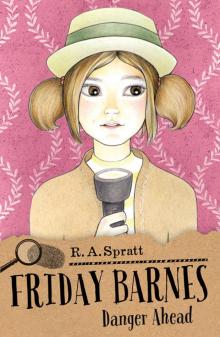 Danger Ahead
Danger Ahead Nanny Piggins and the Runaway Lion
Nanny Piggins and the Runaway Lion The Adventures of Nanny Piggins
The Adventures of Nanny Piggins